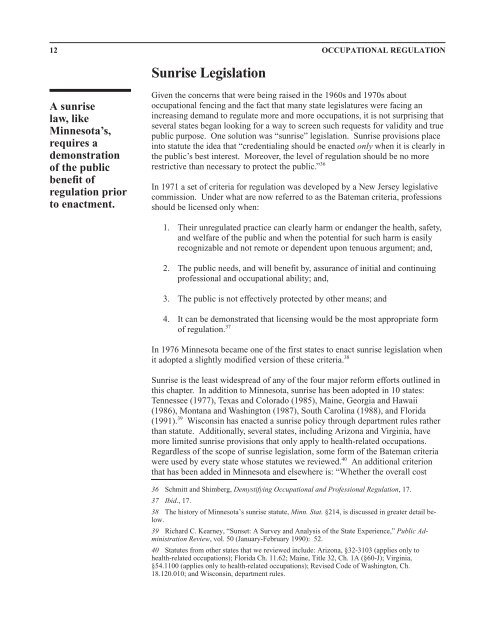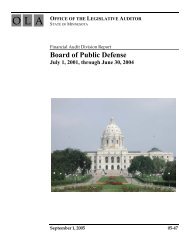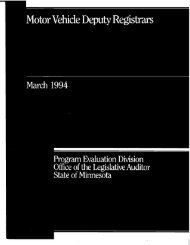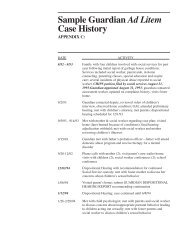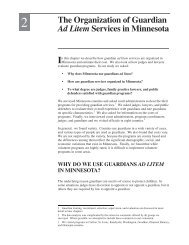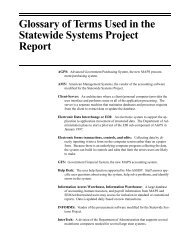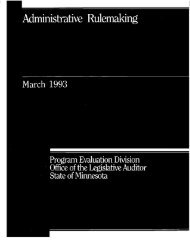Occupational Regulation - Office of the Legislative Auditor
Occupational Regulation - Office of the Legislative Auditor
Occupational Regulation - Office of the Legislative Auditor
You also want an ePaper? Increase the reach of your titles
YUMPU automatically turns print PDFs into web optimized ePapers that Google loves.
12 OCCUPATIONAL REGULATION<br />
Sunrise Legislation<br />
A sunrise<br />
law, like<br />
Minnesota’s,<br />
requires a<br />
demonstration<br />
<strong>of</strong> <strong>the</strong> public<br />
benefit <strong>of</strong><br />
regulation prior<br />
to enactment.<br />
Given <strong>the</strong> concerns that were being raised in <strong>the</strong> 1960s and 1970s about<br />
occupational fencing and <strong>the</strong> fact that many state legislatures were facing an<br />
increasing demand to regulate more and more occupations, it is not surprising that<br />
several states began looking for a way to screen such requests for validity and true<br />
public purpose. One solution was “sunrise” legislation. Sunrise provisions place<br />
into statute <strong>the</strong> idea that “credentialing should be enacted only when it is clearly in<br />
<strong>the</strong> public’s best interest. Moreover, <strong>the</strong> level <strong>of</strong> regulation should be no more<br />
restrictive than necessary to protect <strong>the</strong> public.” 36<br />
In 1971 a set <strong>of</strong> criteria for regulation was developed by a New Jersey legislative<br />
commission. Under what are now referred to as <strong>the</strong> Bateman criteria, pr<strong>of</strong>essions<br />
should be licensed only when:<br />
1. Their unregulated practice can clearly harm or endanger <strong>the</strong> health, safety,<br />
and welfare <strong>of</strong> <strong>the</strong> public and when <strong>the</strong> potential for such harm is easily<br />
recognizable and not remote or dependent upon tenuous argument; and,<br />
2. The public needs, and will benefit by, assurance <strong>of</strong> initial and continuing<br />
pr<strong>of</strong>essional and occupational ability; and,<br />
3. The public is not effectively protected by o<strong>the</strong>r means; and<br />
4. It can be demonstrated that licensing would be <strong>the</strong> most appropriate form<br />
<strong>of</strong> regulation. 37<br />
In 1976 Minnesota became one <strong>of</strong> <strong>the</strong> first states to enact sunrise legislation when<br />
it adopted a slightly modified version <strong>of</strong> <strong>the</strong>se criteria. 38<br />
Sunrise is <strong>the</strong> least widespread <strong>of</strong> any <strong>of</strong> <strong>the</strong> four major reform efforts outlined in<br />
this chapter. In addition to Minnesota, sunrise has been adopted in 10 states:<br />
Tennessee (1977), Texas and Colorado (1985), Maine, Georgia and Hawaii<br />
(1986), Montana and Washington (1987), South Carolina (1988), and Florida<br />
(1991). 39 Wisconsin has enacted a sunrise policy through department rules ra<strong>the</strong>r<br />
than statute. Additionally, several states, including Arizona and Virginia, have<br />
more limited sunrise provisions that only apply to health-related occupations.<br />
Regardless <strong>of</strong> <strong>the</strong> scope <strong>of</strong> sunrise legislation, some form <strong>of</strong> <strong>the</strong> Bateman criteria<br />
were used by every state whose statutes we reviewed. 40 An additional criterion<br />
that has been added in Minnesota and elsewhere is: “Whe<strong>the</strong>r <strong>the</strong> overall cost<br />
36 Schmitt and Shimberg, Demystifying <strong>Occupational</strong> and Pr<strong>of</strong>essional <strong>Regulation</strong>, 17.<br />
37 Ibid., 17.<br />
38 The history <strong>of</strong> Minnesota’s sunrise statute, Minn. Stat. §214, is discussed in greater detail below.<br />
39 Richard C. Kearney, “Sunset: A Survey and Analysis <strong>of</strong> <strong>the</strong> State Experience,” Public Administration<br />
Review, vol. 50 (January-February 1990): 52.<br />
40 Statutes from o<strong>the</strong>r states that we reviewed include: Arizona, §32-3103 (applies only to<br />
health-related occupations); Florida Ch. 11.62; Maine, Title 32, Ch. 1A (§60-J); Virginia,<br />
§54.1100 (applies only to health-related occupations); Revised Code <strong>of</strong> Washington, Ch.<br />
18.120.010; and Wisconsin, department rules.


